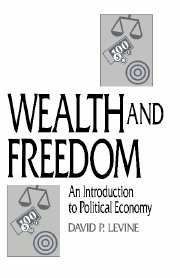Book contents
- Frontmatter
- Contents
- List of figures and tables
- Preface
- Introduction
- I Economy and society
- II Capitalism
- III Inequality and difference
- 7 The classical argument for inequality
- 8 Income and productive contribution
- 9 Rights and the market
- 10 Poverty and inequality
- IV International society
- V Individual and community
- References
- Index
10 - Poverty and inequality
Published online by Cambridge University Press: 20 March 2010
- Frontmatter
- Contents
- List of figures and tables
- Preface
- Introduction
- I Economy and society
- II Capitalism
- III Inequality and difference
- 7 The classical argument for inequality
- 8 Income and productive contribution
- 9 Rights and the market
- 10 Poverty and inequality
- IV International society
- V Individual and community
- References
- Index
Summary
Poverty
Capitalism holds out the promise of economic well-being for those who immerse themselves in the market, the “cash nexus” as Marx refers to it. Admission to the market is open to anyone with something to sell. By the same token, however, the market is closed to those with nothing of (market) value. The market is the ultimate arbiter of who has something of value and how much that something is worth.
The market has no interest in assuring that we all have something of value or that the value of what we own will be sufficient to provide us income adequate to meet our needs. The possibility always exists that we will be left out. If we are left out, then the private enterprise economy tells us that we must bear the burden of the worthlessness of our endowment. Those left in this state are the poor, and their state is one of poverty (see Dreze and Sen 1989).
Poverty means deprivation, but deprivation of what? Poverty means unsatisfied wants, but wants of what kind? Before exploring the relation of poverty to capitalism, we need to consider further what it means to be poor.
Clearly, we could take survival as a benchmark, perhaps treating famine as the limiting point of poverty. Yet famine differs from poverty in that, unlike famine, poverty is a way of life. Understanding poverty as a way of life demands that we define it in broader terms than those suggested by the notion of survival.
- Type
- Chapter
- Information
- Wealth and FreedomAn Introduction to Political Economy, pp. 114 - 124Publisher: Cambridge University PressPrint publication year: 1995



